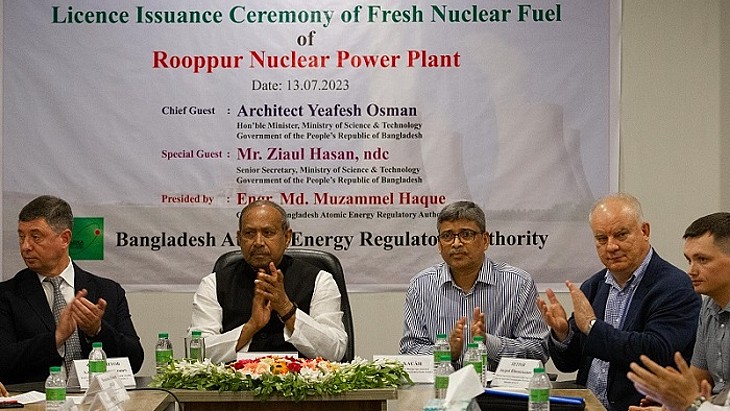 At an official ceremony in the city of Pabna in Bangladesh, class B, D, and E licences were issued to the Bangladesh Atomic Energy Commission (BAEC) by the Bangladesh Atomic Energy Regulatory Authority (BAERA) authorising nuclear fuel handling, storage and transportation. The fuel is expected to be delivered in September to the Rooppur NPP being built by Rosatom.
At an official ceremony in the city of Pabna in Bangladesh, class B, D, and E licences were issued to the Bangladesh Atomic Energy Commission (BAEC) by the Bangladesh Atomic Energy Regulatory Authority (BAERA) authorising nuclear fuel handling, storage and transportation. The fuel is expected to be delivered in September to the Rooppur NPP being built by Rosatom.
The ?lass B licence authorises purchase, ownership, handling and storage of nuclear materials, class D allows a Russian transport company to transport the nuclear materials, and class E allows the import of nuclear materials.
The ceremony was attended by Yeafesh Osman, Bangladesh Minister of Science & Technology; Alexey Ferapontov, Deputy Head of Russia’s Federal Service for Environmental, Technological & Nuclear Supervision (Rostekhnadzor); Andrey Petrov, Rosatom’s First Deputy Director General for Nuclear Power: and ASE JSC Vice President Alexey Deriy, Director for Rooppur NPP Construction Project.
“The delivery of nuclear fuel to the nuclear power plant is a complex multi-level process that should meet all international safety standards. The next stage of this process is the acceptance inspection in Novosibirsk [where it is manufactured]. The fuel will not be shipped and delivered to the Rooppur NPP until all necessary inspections and scheduled procedures have been completed,” said Deriy.
The Rooppur plant is being built by Rosatom on the eastern bank of the Ganges River in Bangladesh’s Pabna district, about 160 km northwest of Dhaka. It will comprise two VVER-1200 reactors. In November 2011, Russia and Bangladesh signed an inter-governmental agreement on cooperation in the construction of the NPP and in mid-December 2015, a general contract was signed. Construction began in 2021. Construction of the unit 1 began in November 2017 and unit 2 in July 2018. All the plant's fuel is being provided by Rosatom under a contract finalised in August 2019, and the final protocol approving deliver was signed in May. The used fuel will be returned to Russia for processing.
Image courtesy of Rosatom



